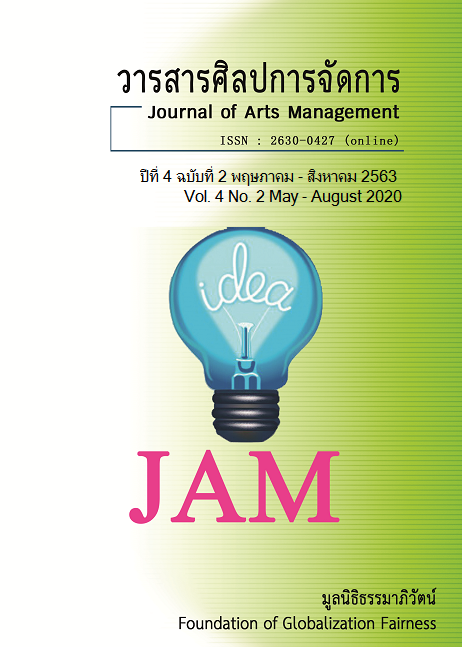Corporate Social Responsibility Management of the Audit Firms In Thailand
Main Article Content
Abstract
This article has the following objectives: to study the characteristics of policy management and management style and to provide the prospective suggestion for managing social responsibility in the context of Thai society of audit firms in Thailand. The research approach is a qualitative research. The informant of the study is the managers of audit firms, which is classified as the Top Best Brand according to Standard 2020 in a total of 21 firms. The researcher used purposive sampling method. The research instrument was the unstructured interview form. The data were analyzed by using content analysis and descriptive writing.
1)The result of research according to Objective 1 indicates that most auditing companies that provide information in the same direction that they are operating under good ethics and good management practices. By being responsible to society, each company may be different in details, but the same objective is to return the welfare and benefit backing to society. 2)The result of the research in accordance to Objective 2 shows that principles of corporate social responsibility include 1) adhere to good governance principles, 2) have a good corporate governance master plan, 3) have common values of the organization, and 4) have a well awareness of CSR practice.Further, the results of the study provide the policy regarding corporate social responsibility, which indicates that good corporate governance master plan has to be made that the private sector rarely undertakes. In addition, firms have to stick to principle of good governance, to have shared values of the firms as well as social welfare-oriented mind. This can apply to policies of audit firms. Findings the Knowledge of 3G1S
Article Details
Views and opinions appearing in articles in the Journal of Arts of Management It is the responsibility of the author of the article. and does not constitute the view and responsibility of the editorial team I agree that the article is copyright of the Arts and Management Journal.
References
กรมพัฒนาธุรกิจการค้า (2560.)รายชื่อสำนักงานบัญชีคุณภาพ. สืบค้น 5 พฤษภาคม 2560,จากhttps://www.dbd.go.th/more_news.php?cid=929 &filename=index.
กรมพัฒนาธุรกิจการค้า, (2562)การจดทะเบียนธุรกิจ ประจำเดือนพฤศจิกายน 2562 กรมพัฒนาธุรกิจการค้า, สืบค้น 20 เมษายน 2563 0kdhttps://www.dbd.go.th/news_view.php?nid= 469416642
จิตติมา วิเชียรรักษ์, มัทนชัย สุทธิพันธุ์, กาญจนา รอดชุม,นันทิกานต์ ประสพสุข, วัลชนก ติ้งเพ็ง,และ เหมือนฝัน บุญสง. (2562). ความสัมพันธ์ของการเปิดเผยรายงานความรับผิดชอบต่อสังคมของกิจการกับค่าใช้จ่ายในการสอบบัญชีของบริษัทจดทะเบียนในตลาดหลักทรัพย์แห่งประเทศไทย. วารสารวิชาการมหาวิทยาลัยหอการค้าไทย มนุษยศาสตร์และสังคมศาสตร์, 39(2), 68-82.
พงศ์ปณต พัสระ และสุชีพ พิริยสมิทธิ์. (2562). การบริหารจัดการบรรษัทบริบาลของสถาบันการเงินในประเทศไทย. วารสารวิจัยการบริการพัฒนา, 9(2), 71-80.
ไพศาล ตั้งสมบูรณ์. (2548). การใช้หลักธรรมาภิบาลในการบริหารของผู้บริหารสถานศึกษาสังกัดสำนักงานเขตพื้นที่การศึกษาสมุทรสาคร. สาขาวิชาการบริหารการศึกษา. กรุงเทพฯ: มหาวิทยาลัยศิลปากร.
ธีระวัฒน์ จันทึก และวสันต์ พรพุทธพงศ์. (2557). ความสัมพันธ์ระหว่างคุณลักษณะนักบัญชีที่พึ่งประสงค์ กับความต้องการในการนำหลักธรรมาภิบาลมาใช้ในการปฏิบัติงาน เพื่อความพร้อมเข้าสู่ประชาคมเศรษฐกิจอาเซียน. วารสารวิชาการมหาวิทยาลัยกรุงเทพธนบุรี, 3(1), 98-109.
นุปกรณ์ หาญภูวดล. (2556). ความสัมพันธ์ระหว่างคุณลักษณะของกิจการ และคุณลักษณะของงานตรวจสอบต่อการกำหนดค่าธรรมเนียมการสอบบัญชี. วารสารมหาวิทยาลัยราชภัฏลำปาง, 2(1), 96-106.
สภาวิชาชีพบัญชีในพระบรมราชูปถัมภ์. (2560). การส่งเสริมและการกำกับดูแลคุณภาพงานสอบบัญชี. สืบค้น 25 พฤศจิกายน 2560, จาก http://fap.or.th.a33.readyplanet.net/images/sub _1359024 609/Mission%20And%20Vision%20for%20Board%20edited%2012_02_13.pdf
สิตางศุ์ สุนทรโรหิต. (2550). การมีส่วนร่วมของบุคลากรที่มีต่อการแสดงความรับผิดชอบทางสังคม ขององค์กรธุรกิจที่ได้รับรางวัลคณะกรรมการแห่งปี ที่มีผลงานดีต่อเนื่อง. กรุงเทพฯ: จุฬาลงกรณ์มหาวิทยาลัย.
สุจิตรา บุณยรัตพันธุ์. (2549). รายงานวิจัยเรื่องประชาชนและธรรมาภิบาล: การสำรวจทัศนคติของคนไทยในภาคเหนือและภาคตะวันออกเฉียงเหนือ. กรุงเทพฯ: สถาบันบัณฑิตพัฒนบริหารศาสตร์.
Hammond, A. L. & Prahalad C. K. (1998). Harvard Business Review on Corporate Responsibility. Harvard: Harvard Business Press.
Habib, A. (2012). Growth opportunities, earnings permanence and the valuation of free cash flow. Australasian Accounting Business and Finance Journal. 5(4), 101-122.
Iszatt-White M and Saunders C. (2014). Leadership. Oxford: Oxford University Press.
Kotler, P. & Lee, N. (2005). Corporate Social Responsibility : Doing the Most Good for your Company and Your Cause. New Jercy: Wiley.
María Consuelo Pucheta‐Martínez Inmaculada Bel‐Oms. (2018). The engagement of auditors in the reporting of corporate social responsibility information. Journal Corporate Social Responsibility and Environmental Management, 26(1), 46-56.


